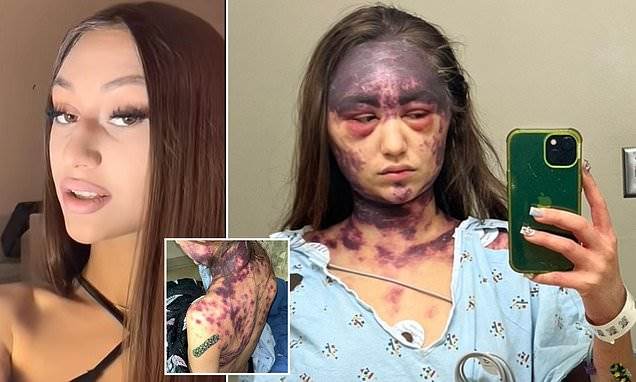
A 23-year-old woman from Florida, Alexis Lorenze, has reported severe health complications following a series of vaccinations she was required to receive before undergoing a blood transfusion for a rare autoimmune condition known as Paroxysmal Nocturnal Hemoglobinuria (PNH). Diagnosed in January 2024, PNH affects approximately one in a million people, causing the immune system to attack red blood cells.

Earlier this month, Lorenze traveled to California for a transfusion, but she claims doctors at UCI Medical insisted she receive vaccinations for tetanus, pneumonia, and meningitis all at once. Shortly after the vaccines were administered, she experienced alarming symptoms: her vision went dark, her jaw locked, and she began vomiting.
Additionally, Lorenze reported severe swelling and bruising, prompting her to seek further medical attention.
Medical professionals have cautioned against administering multiple vaccines to patients with autoimmune disorders like PNH. The concern is that such combinations can trigger cytokine storms—overreactions of the immune system that may lead to severe complications, including organ damage. However, doctors indicated that the vaccines themselves were unlikely to have caused her symptoms directly.
Instead, they suggested that her PNH may have flared up in response to the vaccines.

Dr. Stuart Fischer, an internal medicine physician, emphasized that administering three vaccines simultaneously can be risky, especially for someone with an immune-related illness. “I don’t think I’ve heard of giving three vaccines at once.
It’s important to ask: What’s the urgency?” he noted.
The rationale behind the hospital's decision to require the vaccines remains unclear. Dr. Raj Dasgupta, chief medical advisor at Fortune Recommends Health, highlighted that while combining vaccines is generally safe for most individuals, Lorenze’s compromised immune system warranted a more cautious approach. Spacing out the vaccinations could have minimized the risk of severe reactions.
In her TikTok videos, Lorenze has detailed her experience, claiming she had not received any vaccinations since childhood. She is among nearly 14,000 Americans who have reported vaccine-related injuries to the Health Resources and Services Administration. Conversations captured in her videos suggest that medical professionals do not attribute her symptoms to an allergic reaction but rather to her underlying condition being exacerbated by the vaccines.
Dr. Paul Offit, director of the Vaccine Education Center at Children’s Hospital of Philadelphia, remarked that severe immediate reactions are typically allergic in nature. He added that blindness, while unusual, is not typically linked to vaccine reactions but could stem from low blood pressure or blood loss associated with PNH.
Lorenze’s condition is particularly concerning as PNH can lead to thrombosis—blood clots in various parts of the body, including the eyes and brain.
Dr. Gloria Gerber, a hematologist at Johns Hopkins, noted that such clots could explain her temporary vision loss, as PNH patients are at increased risk for these serious complications.
The family is now attempting to transfer Lorenze to a private hospital in Los Angeles for further care. Her father, Todd Lorenze, shared on Facebook that while her swelling is decreasing, she remains in considerable pain.
As the situation develops, it raises questions about the protocols surrounding vaccinations and the treatment of patients with complex medical histories like PNH.
Ultimately, Lorenze’s experience sheds light on the complexities of managing rare autoimmune diseases and the potential risks associated with vaccinations in vulnerable populations. Medical experts continue to emphasize the need for personalized treatment plans that consider the unique health challenges faced by individuals with conditions like PNH.



















